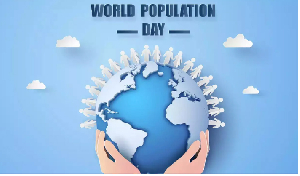World Population Day celebrated annually on 11th July is to raise awareness of pressing global population challenges. This year’s theme underscores the critical role of Ghana’s youthful population in shaping sustainable development.
The 2021 Population and Housing Census (PHC) recorded 30.8 million total population and out of this, 12 million were youthful between the ages of 15 and 24. This youthful population can bring several potential benefits to the economy, but it can also pose certain challenges if not harnessed properly.
In Africa, more than 60% of the population is under the age of 25 (UNFPA, 2017).
It is projected that by 2030, young Africans are expected to constitute 42% of global youth population (World Economic Forum, 2022).
According to the Ashanti Regional Population Director, Mercy Adomah Besseah, Ghana, like many other sub-Saharan countries is experiencing a demographic shift characterized by a significant youth bulge which represents a vast pool of talent, energy, and creativity capable of driving positive change across various sectors of the economy including technology transfer, entrepreneurship development and active participation in governance.
This demographic dividend presents both opportunities and challenges to the nation.
If managed incorrectly, a youthful population could be problematic in certain areas of development. but not limited to a strain on education and healthcare services, youth unemployment and high dependency on the aging working population, wanton destruction of natural resources for economic gains, increase in infant mortality and maternal deaths, economic stagnation and wide range of social vices such as drug addiction, hooliganism, gambling, prostitution, armed robbery and sexually transmitted infections including HIV / AIDS due to their vulnerability to sexual abuse.
She added that migration of the active population between the ages of 20 and 49 to Europe and Americas in search of greener pastures is on the ascendency according to the 2021 PHC Thematic Report on Migration.
Young people migrate for a plethora of reasons. These are often related to important life transitions such as obtaining higher education, finding and starting work, escaping from poverty and insecurity of getting married as well as environmental changes.
She emphasized that these are clear indications of the need to invest in the development of all young people, enforce policies and programmes and enact new laws to protect and guide the development of these people in order to prepare them to take adult roles and responsibilities in the near future.
Collaboration among government agencies, private sector entities, civil society organizations and international partners can help build resilient societies by fostering partnerships that promote youth inclusion in decision-making processes, and provide funding for youth-led initiatives that create supportive environments for innovation and entrepreneurship.
As Ghana commemorates World Population Day 2024 under the theme of harnessing the power of its 12 million youth, it reaffirms its commitment to building a resilient future and by investing in the education, health, agriculture and social infrastructure and the well-being of its young population, Ghana not only secures socio-economic prosperity but also sets a precedent for leveraging demographic dividends across Africa and beyond.
Regional News of Monday, 14 October 2024
Source: The Mmofra headquarters

















